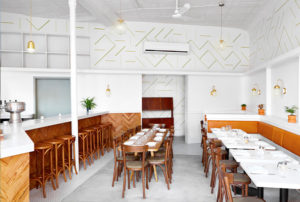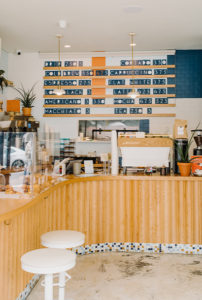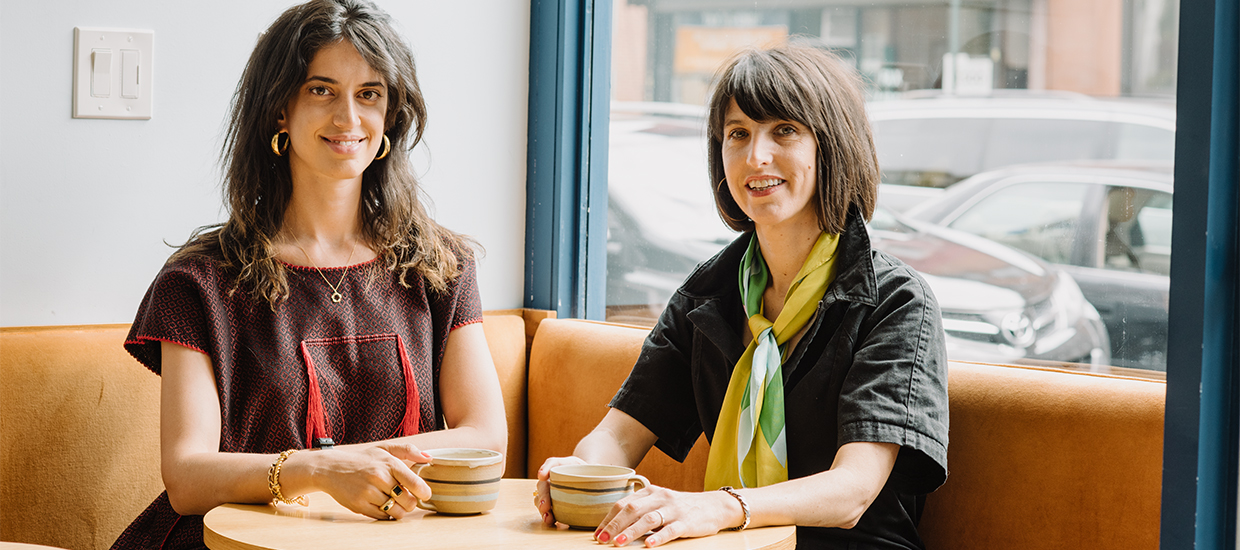On a busy stretch of Franklin Avenue in Brooklyn’s rapidly changing Bedford-Stuyvesant neighborhood, the bright blue, tiled facade of the Mediterranean café Golda stands in stark contrast with the surrounding brownstones and bodegas. Inside, the pale walls, globe lights, and playfully arranged houseplants signal that this is the type of healthy-minded place where one can order, say, a charcoal latté or an açaí yogurt bowl. The women behind Golda’s sunny look—who have helped popularize the bright, minimalist, “all-day café” aesthetic that’s popping up from Philadelphia to Houston to Paris—are Anna Polonsky and Amy Shapiro Morris, the creative minds that comprise the strategy and design firm The MP Shift.

Polonsky and Morris are adamant that they want to avoid a signature style in their projects, which include Golda, Paris’s LA-inspired deli and coffee shop, and Echo. But their spaces all share a refreshing and casual breeziness that seems a perfect antidote to prevailing hospitality trends. In place of the dark barn woods, Edison bulbs, and turn-of-the-20th-century bric-a-brac that define what might be called the “Brooklyn look” (think of the Ace Hotel chain), Polonsky and Morris employ bold colors, light woods, statement tiles, and sleek mid-century furnishings. The resulting spaces look less like your grandmother’s attic and more like your cool older sister’s apartment in Santa Monica. “We helped take people out of the trends and start something new,” Morris says, “which was the brighter all-day café.”
“We had both noticed that lots of chefs and restaurateurs didn’t have a holistic vision of their concepts,” Polonsky says over the whirring espresso machine on a busy June morning at Golda. “Sometimes the food was great, sometimes the design was interesting, but then the marketing and the graphics were terrible. So we thought we needed to create an agency where we can help from A to Z.”
The pair met through mutual friends a decade before founding The MP Shift—“M” for Morris, “P” for Polonsky, “shift” for restaurant shift—in late 2014. Morris previously worked as a marketing consultant for companies like Etsy and Condé Nast and later launched a residential design firm, The Anchor Council; Polonsky served as a partner and U.S. director of Le Fooding, a Paris-born organization that publishes restaurant guides and plans pop-up events around the world with chefs and artists. This breadth of experience helps them work with clients on everything from developing a floor plan to selecting a font for menus to fine-tuning the language on their website.
“We’re asking our clients, what’s important to the brand, and how do you articulate that—not just in the design or the graphics, but also in your staff,” Morris says. “How are they communicating that to their guests?”

The MP Shift first grabbed national attention when the Brooklyn café Tilda All Day (now rebranded as Otway)—which features Sol LeWitt–style patterned walls—earned a spot on Bon Appétit’s 2016 list of America’s five best-designed restaurants.
“When we travel,” says Morris, “we’re looking at visuals. When we walk into a room, we’re not just thinking about what we’re going to order for our breakfast; we’re looking at the chairs, the tables, how the walls are treated, what kind of shelves they’re using.”
For instance, at Three Owls, a West Village deli and gourmet market slated to open later this year, they’re using simple square floor tiles that evoke “being in France or Spain and going to your local bread shop, where they know you and know the croissant you’re looking for,” Morris explains. At Botanero, a mezcal bar in Paris—where the firm has a growing client list—the designers have commissioned a Mexican artist to create lucha libreposters to paper the walls of, yes, the bathroom. And The MP Shift is continuing to broaden its footprint beyond the City of Light, working on the interiors for Vibrant, a new health food restaurant in Houston, and branding for The Blake, a hotel that’s set to open in New Haven, Connecticut, this fall.
“We’re excited by any sort of development that works with third spaces,” Polonsky says, referencing the “third place”—a term for a social environment outside of home or work that was popularized by sociologist Ray Oldenburg. “People think of us as trendy, but we’re equally excited by New Haven or working with a developer—as long as it’s a fun challenge.”




